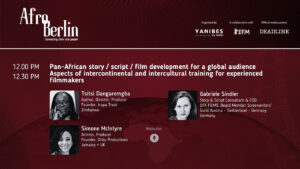Tsitsi Dangarembga & Gabriele C. Sindler @ EFM | AfroBerlin
The first edition of AfroBerlin, organised by Yanibes, is a platform for participants to discuss issues with key players in the African film industry and so gather valuable information about the market potential of content by African and Afro-diasporic filmmakers.
On February 17th 2024 Tsitsi Dangarembga and Gabriele C. Sindler speak about
Pan-African Story | Script | Film Development for a Global Audience
Aspects of intercontinental and intercultural training for experienced filmmakers.
The world is in desperate need of ideas how we can progress as humanity. So far, African films have contributed little to this discourse. We will all benefit from engaging with non-dominant imaginaries embedded in their narratives.
Tsitsi Dangarembga’s Institute of Creative Arts for Progress in Africa (ICAPA Trust) has been committed to the improvement of the film industry on the African continent since 2009. Supporting women in the film business is just as important as the promotion of African stories and their authentic storytelling on big screens around the world.
In 2023, Dangarembga’s Harare-based ICAPA Trust launched a pan-African training series for female-dominated creative teams. The kick-off workshop in Lagos, Nigeria, was facilitated by leading script analysts, story & script writing teachers from DFK FILMS | dfk*script*service, led by Gabriele Sindler. The participants and their projects came from Botswana, Kenya, Rwanda, Zimbabwe, São Tomé and Príncipe, Côte d’Ivoire, Egypt, Tanzania and Nigeria.
The workshop series focuses on:
– Development of Stories & Characters
– Analysis of Screenplays & Films
– Exposé | Treatment & Script Writing
– From screenplay to film production & distribution.
The goal of the further training of film professionals is the successful production and international distribution of feature films and documentaries. Furthermore, the participants are enabled to support each other professionally during the development and production of future projects. The aim is to narrate local stories in a way that they will be watched, understood, and discussed by as many people as possible across the globe.
Tstisi Dangarembga and Gabriele Sindler reflect on their practical efforts in the development of globally appealing African stories, scripts and films by systematically and methodically analyzing their intercultural African-European cooperation.

![Martin Kraft [CC BY-SA (https://creativecommons.org/licenses/by-sa/3.0)]](https://www.dfkfilms.com/wp-content/uploads/2019/01/mjk-15567-logo-berlinale-128px.jpg)